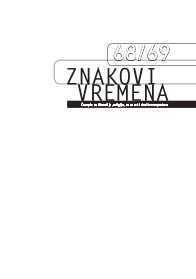Tragom jednog virda iz Mostara
Following a wird from Mostar
Contribution to the history of naqshibandi tariqa in Bosnia and Herzegovina
Author(s): Alija DilberovićSubject(s): History, Theology and Religion, Islam studies
Published by: Naučnoistraživački institut »Ibn Sina«
Keywords: Mostar; Banja Luka; naqshibandi tariqa; Hajji Ahmed Hadžiselimović Vehbi-baba; Muhammed Džan; Said Džan; Mecca; Ali Šumnulu; Istanbul; Bala Tekke; Hajji Mustafa; the son of Ibrahim Mostarac
Summary/Abstract: The intent of this paper is to point to the existence of a branch of a naqshibandi tariqa in Bosnia and Herzegovina, one that has not been discussed, so far, in the scholarly papers on the history of naqshibandi tariqa and Sufism, in general, in our country. The main source for this paper is a document that is kept in the Archives of Herzegovina-Neretva Canton in Mostar, and the document in question is a wird i. e. Everyday Sufi prayers in the form of dhikr. The owner of this document was a certain dervish called Hajji Mustafa, the son of Ibrahim. In addition to his name, the document mentions the names of certain naqshibandi teachers who have not been known in the Bosnian Sufi tradition. Our research on these sheikhs has brought to light the information based on which we can conclude that this was a significant branch of the naqshibandi tariqa that existed in the Ottoman state and had its adherents even among the highest classes of Ottoman society. The center of this branch of naqshibandiyya was in Mecca from where it spread its teachings throughout the Islamic world, which is how it came to Bosnia and Herzegovina.
Journal: Znakovi vremena - Časopis za filozofiju, religiju, znanost i društvenu praksu
- Issue Year: XVIII/2015
- Issue No: 68-69
- Page Range: 117-128
- Page Count: 12
- Language: Bosnian

